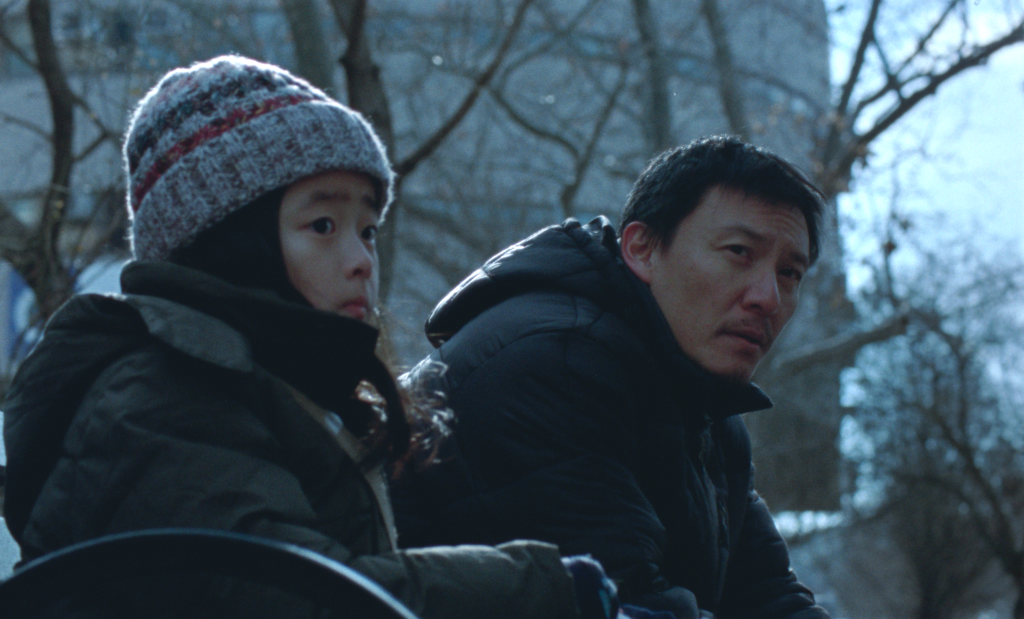Some of the most inspired and creative voices in modern cinema have debuted or premiered their films at the Cannes Film Festival sidebar Quinzaine des cinéastes (or Directors’ Fortnight). Although this isn’t the section of the famed festival that gets the most attention, it is where many of the Cannes’ standouts are. And this year was no different. In this capsule review piece, I will discuss three films that screened in the 2025 edition of the Quinzaine, two of which are among the best offerings from the section, and all of which feature directors with fresh voices and contain interesting ideas: The Girls We Want (Prïncia Car), Kokuho (Lee Sang-il), and Lucky Lu (Lloyd Lee Choi).

The Girls We Want (Les filles désir, Directed by Prïncia Car)
Prïncia Car’s The Girls We Want (Les filles désir) paints a portrait of free-spiritedness and insecurity that remains incomplete by the time the credits roll, but somehow that missing part serves both to the benefit and detriment of the film. During the first half, we follow Omar (Houssam Mohamed), a twenty-year-old overseeing a neighborhood societal center in Marseilles for the summer. He is madly in love with Yasmine (Leïa Haichour, the best performer in the young cast, but with the most underwritten role). His friends, who are also helping him in the center, behave in an immature way whenever she arrives–the hormones and ego of adolescent boys take over them to draw attention from a girl to notice them.
Omar and Yasmine’s dynamic becomes trickier upon the arrival of Carmen (Lou Anna Hamon), who has been away for quite a few years. During her separation from her hometown, she was a sex worker; that detail caused the boys in the group, except Omar, to put her to the side and see her as a hock-up and nothing else. Car makes men’s view of women during adolescence the thematic crux. She has the women and Omar question their behaviors and rationalities, with immaturity and unwillingness to understand being at the forefront. However, I believe the screenplay lacks the complexity to delve deeply into this topic, particularly with the character of Omar.
We see his perspective for the majority of the film, as Omar interacts with both Yasmine and Carmen, whilst questioning how the rest of his friends behave in such a manner. Once we arrive at the second half of The Girls We Want, Car switches perspectives, with Yasmine and Carmen becoming the leads. They are the most interesting characters of the film, by a significant margin. Although this is a move for the better–and you could argue that this should have been how the film proceeded from the beginning–the switch comes way too late and causes a disbalance in the structure and pacing.
Grade: C+

Kokuho (国宝, Directed by Lee Sang-il)
The big surprise, and one of the best films in the Quinzaine, was Lee Sang-il’s Kokuho (国宝), a three-hour tale of revenge, reconciliation, and the art of Kabuki theater. Although long and sometimes strenuous, with a demanding structure and pacing to its narrative, Lee Sang-il keeps the boat steady and afloat through finely constructed set pieces that emulate the theater experience and a keen handling of heightened dramatic sensibilities. The story centers around Kikuo (Ryo Yoshizawa), the son of a yakuza gang leader, who fails to avenge his father’s death and turns to the theater to expel his grief, pain, and angst, leading him to a troubling life of ups and downs.
Beginning in 1964, and ending in the present day, time passes by–the story of a life long lived, both in success and turmoil–as he learns the process of Kabuki theater, which he is a natural at, and is honored by the culmination of his career. The majority of the film does contain excessive flair, shot and framed with mostly static cameras; the vibrancy and vivacity come from the details in the sets and costumes, as well as the performances, which are very precise and tactical, almost as if their real personas are shown when on-stage and using their masks off-stage. Kikuo’s journey is divided by performances and reenactment of plays (The Snowbound Barrier, Two Lions, Hanjuro in the Spider).
Each of these plays foreshadows and thematically matches the next chapter in his life, creating a path where theater and reality intertwine for the performers in a magical, and sometimes tragic, way. Lee Sang-il uses his adventurous side of filmmaking in these scenes, adding a vibrant and lavish feel to Kokuho. Each camera movement is carefully thought out and tactfully placed so that, in these instances, you feel you are watching Kabuki theater rather than a film itself. The narrative itself is not original; numerous stories have explored the fine line between revenge and reconciliation, as seen through various art forms. But what gives this film personality is that very aspect of Kabuki theater, something so interesting that not so many people outside of Japan know about. And I, who is not a fan of the theater itself, found myself vastly intrigued by the mechanics of it.
Grade: B

Lucky Lu (Directed by Lloyd Lee Choi)
Another gem in the Quinzaine was Lucky Lu. This film reminded me of a movie that screened at the Semaine de la Critique by Shih Ching-Tsou, Left-Handed Girl, as well as her previous work Take Out, which was co-directed by Sean Barker (also involved in the aforementioned film as co-writer and editor). The three films have many tie-ins and layers that connect them in various aspects. This is something that happens, both intentionally and unintentionally, at Cannes, where an array of films thematically and narratively match each other. But with Lloyd Lee Choi’s film, the resemblances venture forth into Baker and Ching-Tsou’s filmography, rather than just sticking to their latest collaboration. Hence, there are more direct connections with Take Out.
Lucky Lu and Take Out follow an immigrant in New York City who works as a food deliveryman, trying to make ends meet while being paid unfairly and dealing with his grievances. In the case of Lloyd Lee Choi’s film, his name is Lu (Chang Chen, known for his work with Wong Kar-wai–and he’s excellent here). He is expecting his family, whom he has not seen in a long time, in New York in the upcoming days. We follow him throughout his daily life. He delivers food, rides his e-bike from location to location, deals with rude customers, and smokes his occasional cigarette to soothe the stress that comes from the hectic and restless city life.
One day, his e-bike is stolen, robbing him of his employment and leaving him with no means to pay for his new apartment. With his family on the way in just a few hours, Lu tries to find easy ways to make money, whether by stealing the bikes of others or selling the little he has left, before his family arrives and realize that he is living a life full of struggle–breaking the facade of the so-called “American dream.” Lucky Lu has many elements in the narrative to become an overly emotional film that delves into poverty or struggle porn. But Lloyd Lee Choi does not delve into such sensibilities because he does not want to disrespect not only his characters but the people who have gone (and still go through) similar situations.
Cinematographer Norm Li shoots the film with a minimal style and flash, keeping everything grounded and honest. These events were taking place right before our eyes. The camera follows Lu at all times, like a spectre watching his every move, both during his minor moments of joy with his daughter and those of sadness and worry. It is minimal in technique and camerawork, yet it remains vastly effective. You feel for Lu, even during the times when he makes terrible decisions, because you understand his reasoning. The only scene that deviates from that nature is one of the very last, where you feel that Lloyd Lee Choi ups the ante, becoming louder and more flashy rather than silent and minimal. But even then, there is a sincerity to it, which makes Lucky Lu come across safely from that misstep.
Grade: B





